Having keywords in a domain name used to be a powerful way for securing top rankings in the search engines. Exact-match domains (the domain name matches the keyword “blue widget” exactly, i.e. bluewidgets.com), have been considered quite influential for rankings but partial-match domains (the domain contains the keyword but only partially matches it, i.e. darkbluewidgets.com) used to perform as well. Because of this they’ve been used and abused by many companies trying to gain top rankings largely thanks to the keywords in the domain.
9/28/2012 – Exact Match Domain Google Algo Update
On September 28th, Matt Cutts, head of Google’s web spam team announced that Google was rolling out an algorithm update which will reduce low-quality exact match domains in the search results.
Clik here to view.
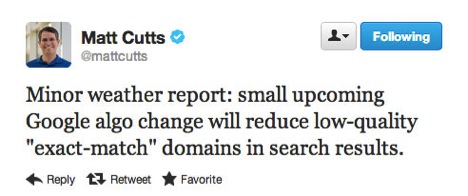
Matt Cutts’s tweet about the exact match domain algo update on 9/29/2012
According to Matt this update will affect 0.6% of English-US queries to a noticeable degree and it is unrelated to the Panda or Penguin update. Early observations, not surprisingly, appear to be seeing higher percentages than estimated by Google.
The algo update is directed at low quality exact match domains that may have been ranking mostly because of the exact keyword match in their domains. It is presumed that with this update Google is looking at many different factors besides the keywords in the domain.
This update did not come as a surprise since, in the past few years, Google has been talking about their plan to look into exact match domain rankings to make sure they don’t only rank because of the exact keyword match.
How Should You Proceed with Keyword Rich Domains?
Google’s Penguin algorithm update hit both exact and partial match domains. Partial-match domains appear to have been hit harder than exact-match domains. The folks at SEOmoz are doing a great job at keeping their eyes on the ranking influence and how things have been changing.
Rankings with partial-match domains (PMD) have been declining since the Penguin update:
Clik here to view.
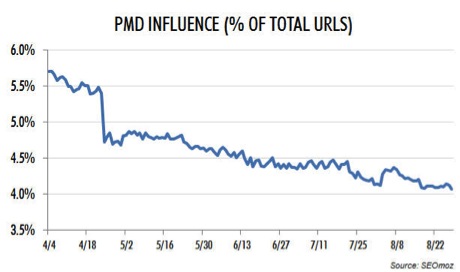
Partial match domain influence on rankings has been significantly declining
Trends suggest that exact-match domain rankings (EMD) are weakening:
Clik here to view.
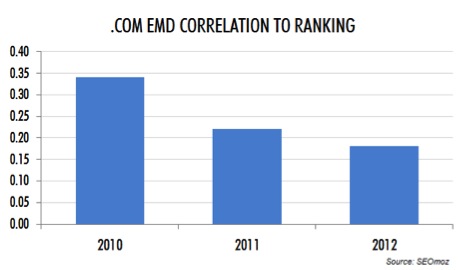
.com exact match domain rankings have been declining
WAIT…IT’S NOT THAT SIMPLE
It wouldn’t be SEO if it were too simple! When we look at exact-match domains only in the #1 spot, we can see that while Penguin affected them initially but about 2 months later we start seeing an actual increase in the rankings. This may be linked to Google returning 7 results in the search results instead of 10. If the number of URLs returned is less but the exact-match domains in #1 position is steady, they would give an explanation for a higher percentage of the total URLs.
Clik here to view.
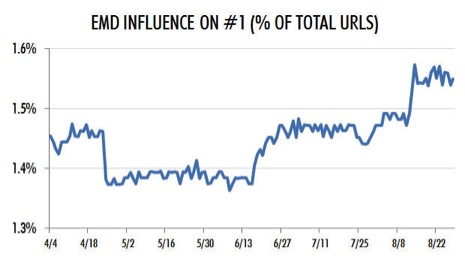
Exact match domain influence on the #1 search engine rankings
Exact-match domains are hard for Google to plainly discount as many brand names are exact match. In these cases, it is not a spammy technique to buy your exact-match domain. So Google is looking at many different signals to help determine how to value these domains.
After the 9/28/2012 exact match domain update, SEOmoz’s MozCast showed a 10.3% change. The graph shows the lowest influence of exact match domains on record since April 2012.
Clik here to view.
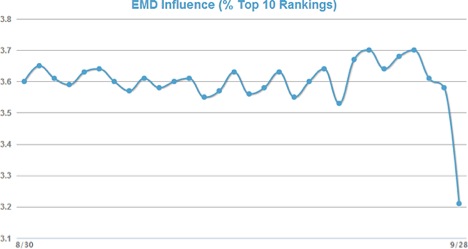
This graph shows the percentage of top 10 results for exact match domains.
Should You Continue Investing Into Your Exact-Match Domain?
If your exact-match domain is performing well, chances are you are fine keeping it but now even more than before, you need to make sure that your site is high quality with great, unique content that will strengthen and support the domain’s relevance. Be sure to pay attention to all the signals you are sending to Google, like too aggressive anchor text link building.
Should You Invest Into a New Exact-Match Domain?
If it is your brand name, certainly buy mybrandname.com but don’t count on that exact match to secure top rankings for you. Definitely avoid long hyphenated domains not only because of diminishing SEO value but also appearing spammy to the site visitors. If you are considering it for the keyword benefits only, it depends on what your plans are. What is your short and long term strategy? Do you have the resources to invest into building up a brand new site’s content, authority and value? Keywords in the domain are just one factor of over 200+ ranking factors. With future updates, they are likely to be less and less significant.
Do Invest Into Your Brand
The best strategy is to invest into your brand to secure long-term benefits that are in line with your business goals and SEO is just one part of that strategy.